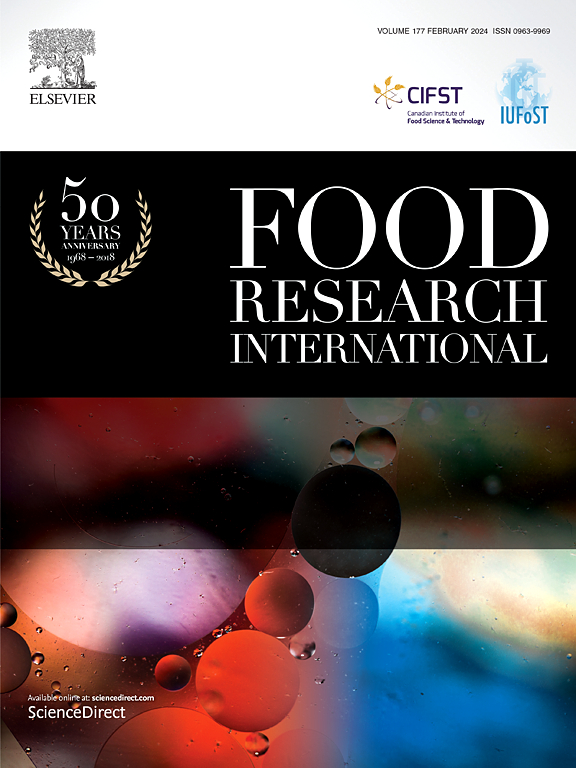Storage stability of an antioxidant tea prepared from purple corn (Zea mays L.) cob and stevia (Stevia rebaudiana Bert.) and its effects on biomarkers of oxidative stress in healthy humans
IF 7
1区 农林科学
Q1 FOOD SCIENCE & TECHNOLOGY
引用次数: 0
Abstract
Tea is consumed worldwide, and it is highly appreciated by consumers as a functional, healthy, and natural drink. The objectives of this research were to evaluate (1) the storage stability and (2) the consumption effect on biomarkers of oxidative stress of an antioxidant tea prepared from purple corn cob and stevia (AOxTea). The AOxTea bags were subjected to storage environments of 75 or 85 % of relative humidity at 30, 40 and 50 °C for up to 19 days. During this time, total polyphenols (TP), total monomeric anthocyanin, TEAC, ORACPGR, and color were monitored. Biomarkers TEAC, ORACPGR, antioxidant enzymes activities, protein carbonyls, and OXY-SCORE index were analyzed on healthy volunteers (n = 18, both genders, BMI = 19–25.5 kg/m2, age = 18–45 years, divided into a control group and an AOxTea consumption group) on time 0, after 2- and 4- weeks of twice daily consumption. During storage, TP and color did not significantly change, while anthocyanins and antioxidant capacity decreased significantly to up 22 and 43 % of their initial values, respectively, in the most severe conditions. Evaluation of the effect of AOxTea on humans showed a significant decrease in ORACPGR and in protein carbonyls after 4 and 2 weeks, respectively, in the consumption group, however, OXY-SCORE values in both groups did not vary significantly. Results indicate that AOxTea has a considerable stability until reaching the typical maximum legal moisture for teas (10 %) and no significant effect of consumption in OXY-SCORE index was found.

紫玉米(Zea mays L.)玉米芯和甜菊糖(stevia reaudiana Bert.)抗氧化茶的储存稳定性及其对健康人体氧化应激生物标志物的影响
茶在世界各地都有消费,作为一种功能性、健康、天然的饮料,受到消费者的高度赞赏。本研究的目的是评价(1)紫玉米芯甜叶菊抗氧化茶(AOxTea)的储存稳定性和(2)消耗对氧化应激生物标志物的影响。AOxTea袋在相对湿度为75%或85%的环境中,在30,40和50°C下储存长达19天。在此期间,监测总多酚(TP)、总单体花青素、TEAC、ORACPGR和颜色。对健康志愿者(n = 18,男女,BMI = 19-25.5 kg/m2,年龄= 18 - 45岁,分为对照组和AOxTea消费组)在每天2周和4周后0时的生物标志物TEAC、ORACPGR、抗氧化酶活性、蛋白质羰基和OXY-SCORE指数进行分析。在贮藏过程中,TP和颜色变化不显著,而花青素和抗氧化能力在最严酷的贮藏条件下分别下降了22%和43%。对AOxTea对人体的影响评估显示,在食用组中,ORACPGR和蛋白质羰基分别在4周和2周后显著降低,但两组的OXY-SCORE值没有显著变化。结果表明,AOxTea在达到茶叶的典型最大合法水分(10%)之前具有相当的稳定性,并且在OXY-SCORE指数中没有发现明显的消费量影响。
本文章由计算机程序翻译,如有差异,请以英文原文为准。
求助全文
约1分钟内获得全文
求助全文
来源期刊

Food Research International
工程技术-食品科技
CiteScore
12.50
自引率
7.40%
发文量
1183
审稿时长
79 days
期刊介绍:
Food Research International serves as a rapid dissemination platform for significant and impactful research in food science, technology, engineering, and nutrition. The journal focuses on publishing novel, high-quality, and high-impact review papers, original research papers, and letters to the editors across various disciplines in the science and technology of food. Additionally, it follows a policy of publishing special issues on topical and emergent subjects in food research or related areas. Selected, peer-reviewed papers from scientific meetings, workshops, and conferences on the science, technology, and engineering of foods are also featured in special issues.
 求助内容:
求助内容: 应助结果提醒方式:
应助结果提醒方式:


